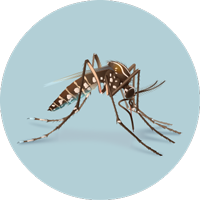Bloodborne Pathogens Identified
Zika Virus
Basic Information
Transmission and Symptoms
The Zika virus can be spread through mosquito bites, sex, blood transfusion and to a fetus from the pregnant mother. Some people do not have symptoms at all or the symptoms are mild. They are often ordinary and typically are: fever, rash, joint paint, and conjunctivitis. Muscle pain and headache can also present. They can last several days to a week. Often, due to their lack of severity, an infected person does not seek medical attention, and does not know they are infected.
Side Effects
During pregnancy, a Zika infection can cause microcephaly, significantly smaller head, and other severe fetal brain defects. Other fetal and infant defects presented as a result of an infection prior to birth are: eye defects, hearing deficiencies, and moderated growth. Guillain-Barré syndrome, a disorder of the immune system, has also appeared in areas impacted by Zika.
Prevention
Mosquito Bites
There is no vaccine for the Zika virus. The best methods of prevention include deterrence from mosquito bites including wearing long-sleeved shirts and long pants. Clothing and other gear that have been treated with permethin are good precautions to prevent mosquito bites. You can treat clothing or buy it already pre-treated.
Insect repellent is also a good deterrent. Per the Centers for Disease Control and Prevention (CDC), they recommend use of an Environmental Protection Agency registered insect repellent that contain one of the following ingredients: DEET, picaridin, IR3535, or oil of lemon eucalyptus or para-menthane-diol. These products have proven safe and effective for pregnant and breastfeeding women, but should not be used on babies less than 2 months old. Do not use oil of lemon eucalyptus or para-methane-diol on children younger than 3 years old.
Sexual Transmission
Condoms and other barriers can prevent the transmission of the Zika virus through any form of sexual contact. Not having sex is another method of prevention from the Zika virus infection.
Testing and Diagnosis
A blood or urine test can confirm a diagnosis of Zika infection. The symptoms of Zika often resemble dengue and chikungunya, which are both viruses spread by the same species of mosquito. Thus, it is important to seek medical attention if you have these symptoms and have traveled to areas affected by the Zika virus. A diagnosis of Zika or other similar viruses is contingent upon recent travel history, symptoms and the test results.
Treatment
The Zika virus does not have a specific medicine or vaccination. Symptoms are to be treated, such as taking acetaminophen, but avoiding non-steroidal anti-inflammatory drugs (NSAIDS) until dengue can be eliminated as a diagnosis to reduce the risk of bleeding. Other treatments include plenty of rest, and drinking fluids to prevent dehydration.
For more information please visit the CDC website dedicated to the Zika Virus. There are multiple printable .pdf files for display and review as well. There are multiple links to locate the various areas affected by Zika if you are thinking of or have recently traveled. Here is the homepage link for affected areas.
If you have any questions at any time regarding the information presented in this tutorial, please contact David Sullivan at 910-916-0688.
Centers for Disease Control and Prevention (2016). Zika Virus.


